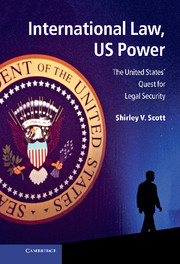Book contents
- Frontmatter
- Contents
- Acknowledgements
- Introduction: beyond the myth of the golden age
- 1 The US quest for legal security
- 2 The US pursuit of legal security through the evolution of the international law of dispute resolution
- 3 The US pursuit of legal security through the evolving regime relating to the use of force
- 4 The US pursuit of legal security in substantive policy arenas
- 5 Techniques through which the United States has reconciled its practice of offensive legal security with the principle of sovereign equality
- 6 The practice of offensive legal security in US diplomacy
- 7 The future of US engagement with international law
- Appendix
- Select bibliography
- Index
- References
5 - Techniques through which the United States has reconciled its practice of offensive legal security with the principle of sovereign equality
Published online by Cambridge University Press: 05 June 2012
- Frontmatter
- Contents
- Acknowledgements
- Introduction: beyond the myth of the golden age
- 1 The US quest for legal security
- 2 The US pursuit of legal security through the evolution of the international law of dispute resolution
- 3 The US pursuit of legal security through the evolving regime relating to the use of force
- 4 The US pursuit of legal security in substantive policy arenas
- 5 Techniques through which the United States has reconciled its practice of offensive legal security with the principle of sovereign equality
- 6 The practice of offensive legal security in US diplomacy
- 7 The future of US engagement with international law
- Appendix
- Select bibliography
- Index
- References
Summary
Modern law . . . begins with an idea of equality among subjects. Legal outcomes are determined by identifying claims of right, not by measuring assertions of power. To identify the operation of political power within an institution of law is to discover a ‘defect’, a site at which reform must be pursued if the values of law are to be maintained.
Paul W. Kahn, 2000The principle of the sovereign equality of states has been fundamental to the system of international law at least since the time of Grotius. The United States recognized the principle in the opening sentence of the Declaration of Independence, which referred to its ‘separate and equal station’ among the powers of the earth, and has done much to promote the principle. And yet, if the United States had acted as simply one state among equals, playing an equivalent role in negotiations and with no greater influence over the outcomes or the operations of international institutions created through international law, it would not have enhanced its offensive legal capacity and gained in relative influence vis-à-vis other states. If the United States had not at the same time guarded its own legal security in the defensive sense, other states would have been able to impact on US policies and laws via international law to a far greater extent than has been the case. Although it is obvious that states are not politically equal and that sovereign equality could therefore be referred to as a legal fiction or normative ideal, the fact that international law has encapsulated the principle seems to beg the question of how the United States has been able to pursue simultaneously its quest for defensive legal security and its practice of offensive legal security.
- Type
- Chapter
- Information
- International Law, US PowerThe United States' Quest for Legal Security, pp. 173 - 201Publisher: Cambridge University PressPrint publication year: 2012

